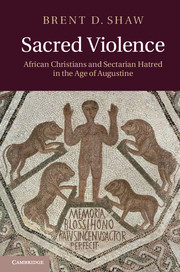Book contents
- Frontmatter
- Contents
- Abbreviations
- Maps
- Acknowledgments
- Introduction
- Chapter 1 This terrible custom
- Chapter 2 Church of the traitors
- Chapter 3 A poisonous brood of vipers
- Chapter 4 Archives of memory
- Chapter 5 The city of denial
- Chapter 6 Ravens feeding on death
- Chapter 7 Little foxes, evil women
- Chapter 8 Guardians of the people
- Chapter 9 In the house of discipline
- Chapter 10 Sing a new song
- Chapter 11 Kings of this world
- Chapter 12 We choose to stand
- Chapter 13 Athletes of death
- Chapter 14 Bad boys
- Chapter 15 Men of blood
- Chapter 16 Divine winds
- Chapter 17 So what?
- Appendix A Bishops and bishoprics in Africa: the numbers
- Appendix B Origins of the division: chronology
- Appendix C The Catholic conference of 348
- Appendix D The Edict of Unity and the Persecution of 347
- Appendix E The mission of Paul and Macarius
- Appendix F Historical fictions: interpreting the circumcellions
- Appendix G The archaeology of suicide
- Appendix H African sermons
- Bibliography
- Index
- References
Chapter 10 - Sing a new song
Published online by Cambridge University Press: 07 September 2011
- Frontmatter
- Contents
- Abbreviations
- Maps
- Acknowledgments
- Introduction
- Chapter 1 This terrible custom
- Chapter 2 Church of the traitors
- Chapter 3 A poisonous brood of vipers
- Chapter 4 Archives of memory
- Chapter 5 The city of denial
- Chapter 6 Ravens feeding on death
- Chapter 7 Little foxes, evil women
- Chapter 8 Guardians of the people
- Chapter 9 In the house of discipline
- Chapter 10 Sing a new song
- Chapter 11 Kings of this world
- Chapter 12 We choose to stand
- Chapter 13 Athletes of death
- Chapter 14 Bad boys
- Chapter 15 Men of blood
- Chapter 16 Divine winds
- Chapter 17 So what?
- Appendix A Bishops and bishoprics in Africa: the numbers
- Appendix B Origins of the division: chronology
- Appendix C The Catholic conference of 348
- Appendix D The Edict of Unity and the Persecution of 347
- Appendix E The mission of Paul and Macarius
- Appendix F Historical fictions: interpreting the circumcellions
- Appendix G The archaeology of suicide
- Appendix H African sermons
- Bibliography
- Index
- References
Summary
People who separate themselves from the community of the holy are not singing a new song. They are following the music of old hatreds, not the new music of charity. What is the music of this new charity? It is peace.
(Augustine)It is forbidden to kill. Therefore every killer is punished, unless he kills as part of a large crowd and to the sound of trumpets. That's the rule.
(Voltaire)Ritual chanting, singing, rhythmic shouting, metrical voices accompanied by bodily gestures like clapping and dancing involved members of Christian congregations in common ritual practices. These types of bodily participation were also an important part of traditional non-Christian sacred ritual and ceremony in Africa. One such performance had imprinted itself vividly on Augustine's memory. As a young man at Carthage he had heard the chanting and singing of songs at a festival for the goddess Berecynthia – the Mother of Everything – songs that he later castigated as grossly obscene, even if quite effective. Among African Christians it was the same. They knew that song had the power to transform hearts and minds. Their leaders, the bishops, knew from their own personal experiences how much song mobilized emotions by appealing to what they called “pleasure,” or voluptas, and that singing did this so strongly that they feared its effects, knew its dangers, and were aware of the subversive threats that it posed, especially to the minds of “the weak.” They wished, if possible, to ban singing and chanting from the church. But they knew that this was not possible. They knew that this power would have to be managed and controlled.
The unifying and mobilizing drive of chants and songs suggested their utility in sustaining crowd actions, sometimes violent ones. The use of rhythmic repetition and exhortations repeated in unison produces group unity and energy. To understand some of the effects, we might begin by retelling the model horror story of the savage beating inflicted on the Catholic bishop Maximianus of Bagaï, a small town in southern Numidia, around the year 403. One day, as Maximianus stood at the altar in his basilica, sectarian enemies rushed at him with what is described as “a terrifying force and a furious cruelty.” His assailants repeatedly struck him with clubs and other makeshift weapons, including jagged pieces of wood that they had broken off the altar when they smashed it to pieces over his head. The terrified bishop had taken refuge underneath it. Getting to him, one of the attackers stabbed the bishop in the groin with a dagger, presumably cutting a femoral artery since he began to bleed profusely.
- Type
- Chapter
- Information
- Sacred ViolenceAfrican Christians and Sectarian Hatred in the Age of Augustine, pp. 441 - 489Publisher: Cambridge University PressPrint publication year: 2011

